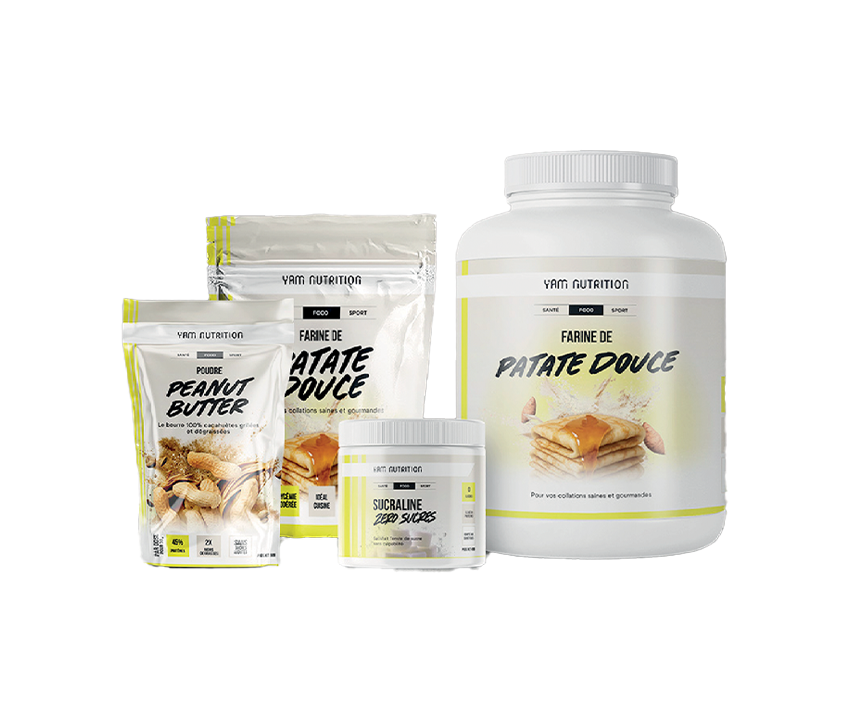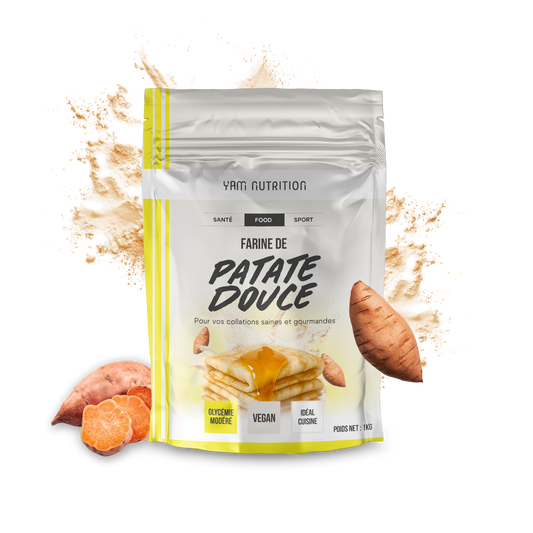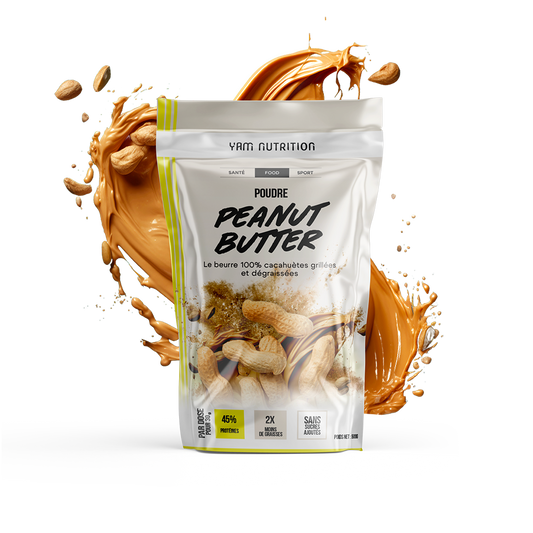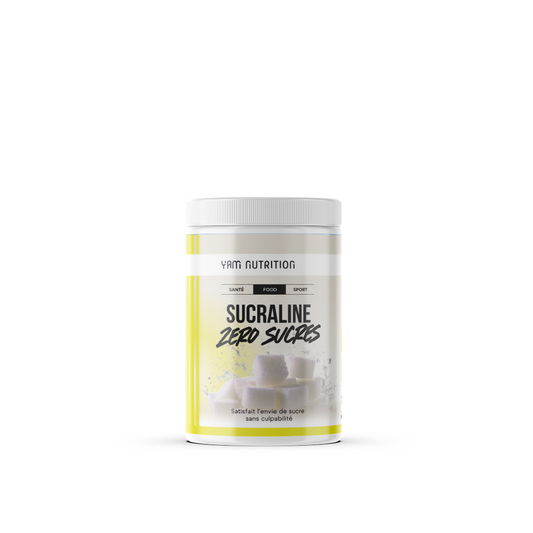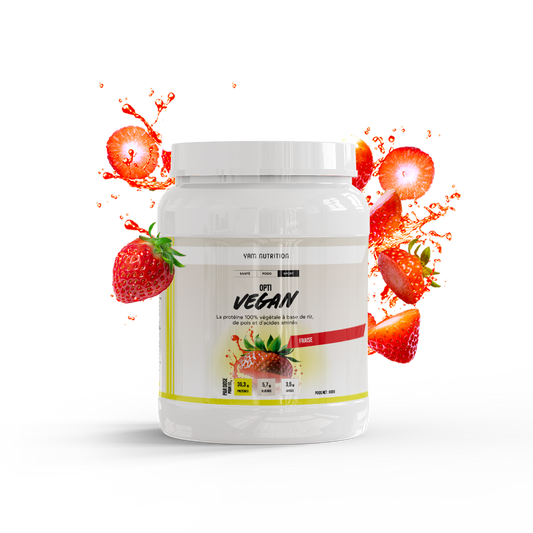The essential basics of sports nutrition

Sommaire
Practice a strength sport like Bodybuilding , weightlifting or cross training is not only based on an exhaustive knowledge of the exercises to be practiced. It is above all about knowing the ways to make your body benefit from them by stimulating muscle growth and strength. To this end, the diet of the strength athlete also requires a certain basic knowledge of the nutrition . This basic knowledge is essentially based around the three major food categories , the proteins , the carbohydrates and the fats . For these three major categories of nutrients, we will also talk about macronutrients. In addition to these three major food families, micronutrients are made up of vitamins, minerals, trace elements, and antioxidants. Broadly speaking, this is what we call sports nutrition.
For your healthy and delicious snacks Peanut butter made with 100% roasted peanuts 100% plant-based protein made from rice, peas and amino acids
Sweet potato flour
Sale price
From 19,90 €
Peanut Butter Powder
Sale price
24,90 €
Opti-Vegan
Sale price
From 37,90 €
The basics of sports nutrition and respect for food hygiene are essential for bodybuilders
Training, recovery and sports nutrition are the three pillars of Bodybuilding . And when it comes to nutritional deficiencies, it's the athlete's diet that's often lacking the most. Young bodybuilding beginners don't know how to eat properly and, as a result, often complain about not progressing in strength and muscle mass. Carbohydrates, proteins, and fatty acids must be provided in a balanced way, depending on the resistance activity being practiced, in order to sufficiently stimulate muscle growth.
To do this, first consider your nutritional intake in carbohydrates to ensure sufficient energy release during your workouts. Indeed, glucose is and always will be the first and only source of energy for your muscle cells, whether you lift a finger or a dumbbell. However, it will always be better to favor complex carbohydrates (saccharides and fibers) in order to stimulate their storage in the form of muscle and liver glycogen. These are glucose chains that constitute your primary energy reserves. And without sufficient glycogen reserves, it would be very difficult for you to gain muscle mass. In terms of sport, you will therefore need to think about your carbohydrate intake before taking creatine or other food supplements .
Protein builds, strengthens and maintains your muscle mass
The proteins in your food are used to build and maintain your muscle fibers. Each of the 22 amino acids recognized by our genetic code and found in protein foods has a role to play. Some of them are essential because our bodies cannot produce them. Thus, we rely largely on dietary protein to meet our nutritional needs. When it comes to bodybuilding, protein and amino acids are more important than for endurance sports because muscle fibers undergo very slight tears during strength exercise. These micro-tears that occur after training are necessary because our muscles will be repaired and strengthened, partly with the intake of amino acids since muscle fibers are made of protein.
Lipids, the third essential macronutrient for strength athletic performance
Often considered synonymous with being overweight, fats are nevertheless essential for strength athletes. Indeed, fatty acids are necessary to form cholesterol, which allows the synthesis of androgen hormones, in men the Testosterone . It is not possible to deprive yourself of fat if you want to gain muscle mass and strength. To this end, count between 1 and 1.2 grams of fat per kilogram of body weight as part of your daily fat intake. Fat is also an excellent source of energy with 9 calories per gram. Some fatty acids such as MCT (medium-chain triglycerides) are beneficial because they are hardly stored in the body. Also, remember to balance your nutritional intake by Omega 3 compared to Omega 6 for the health of your cardiovascular system. Rarer, Omega 7 and palmitoleic acid in particular, have quite remarkable health benefits.
Micronutrients, vitamins, minerals, trace elements and sports nutrition
Obviously, taking into account the balance of “macro” is a first thing to consider when it comes to sports nutrition. Proteins, carbohydrates and lipids must be provided in optimal quantities if you want to stimulate muscle mass gain in the days following your weight training workouts. However, there is no point in gorging yourself beyond your nutritional needs, you will only gain fat, to the detriment of your physical condition. However, micronutrient intake (vitamins, minerals, trace elements) is just as important for your body and athletic performance. Here too, it is a question of quantity (neither too much nor too little) and quality of assimilation, trying to obtain all the vitamins and minerals you need every day.
Minerals and electrolytes such as magnesium (as citrate, bisglycinate or glycerophosphate), calcium, phosphorus and potassium must be seriously considered. Also think about the sodium/potassium balance where you will make sure to get enough potassium through your diet. As you know, it is always easier to consume too much sodium than potassium. However, avoid excesses of these two minerals; the kidneys would balance the two and evacuate the excess in the urine. Conversely, deficiencies in vitamin D and magnesium are much more common. Also think about B vitamins to facilitate the release of energy. The essential vitamin D and vitamin C should also be the subject of your attention. In men (but also in women), zinc and magnesium are essential for healthy synthesis of testosterone .
Once you take all of these nutritional elements into consideration, you will truly understand what sports nutrition means. Then, you will be able to question the relevance of a dietary supplement in creatine , beta-alanine or amino acids to improve your physical performance in weight training or cardio training.
YAM Nutrition
Eric MALLET
Spécialiste en Nutrition Sportive
